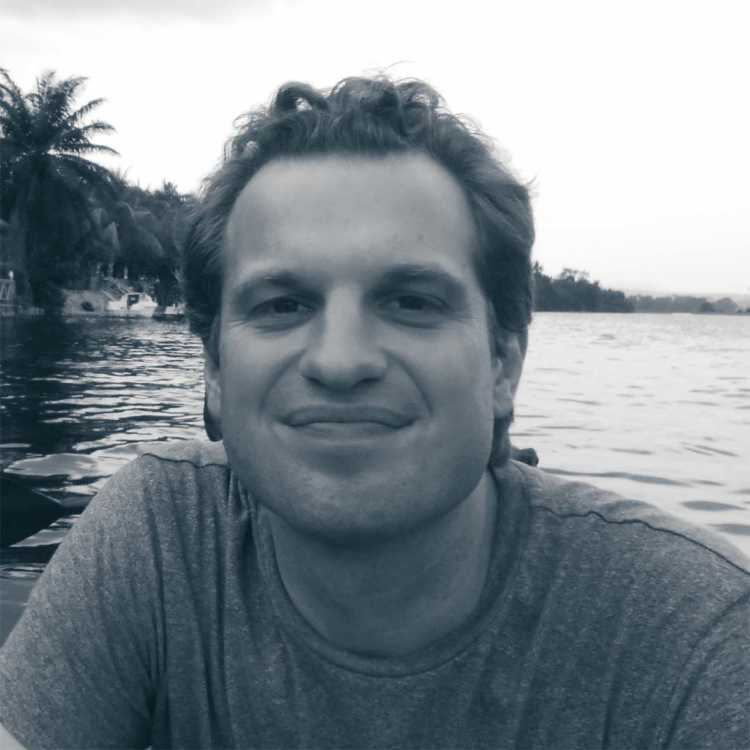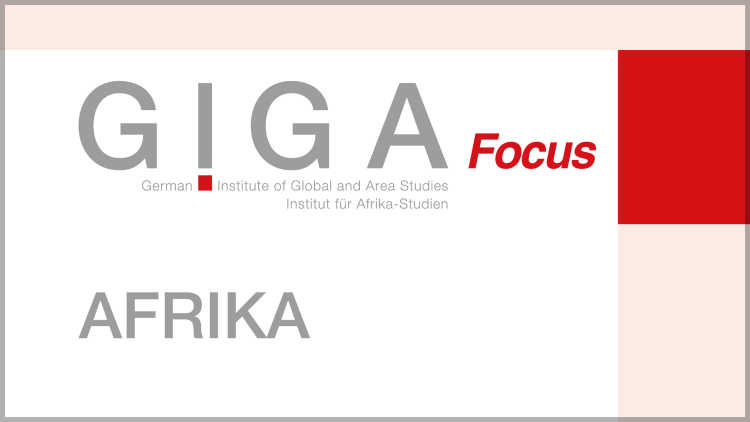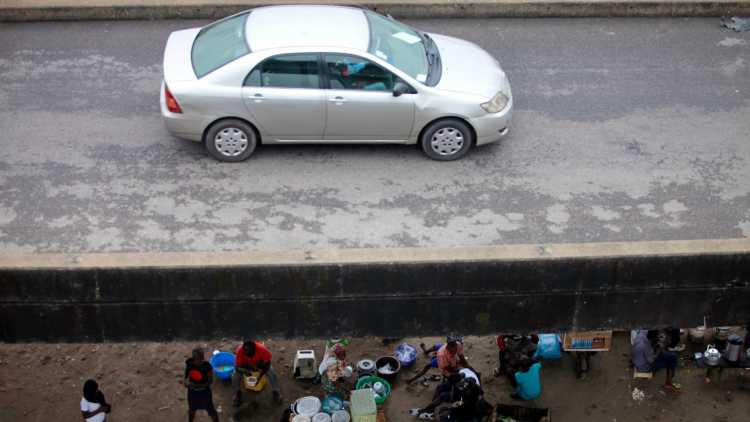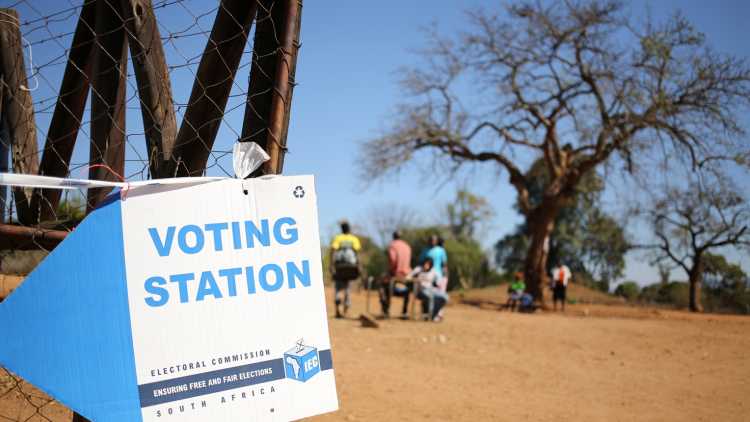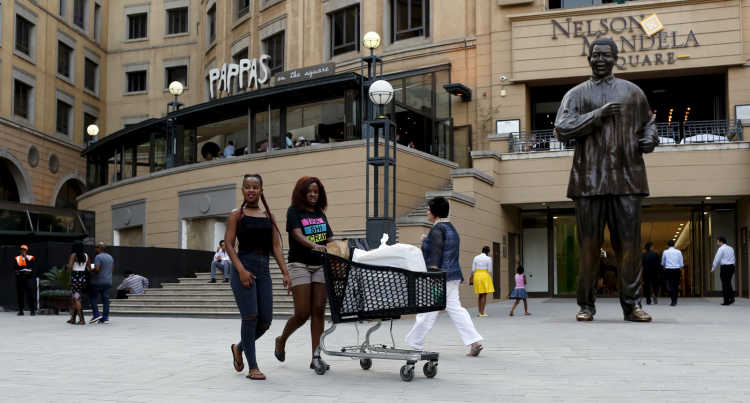- Home
- Publications
- GIGA Focus
- The Slow Decay of Southern Africa’s Dominant-Party Regimes
GIGA Focus Africa
The Slow Decay of Southern Africa’s Dominant-Party Regimes
Number 8 | 2017 | ISSN: 1862-3603

The successful national liberation movements of southern Africa have become dominant-party regimes. However, many now face a series of political and economic crises that have the potential to put the region’s stability at risk.
Dominant-party regimes in southern Africa base their legitimacy on liberating the nation from colonialism and being an expression of the people’s will. However, they preside over an exclusionary social order.
The promotion of formal measures of democratisation which focus on periodic elections, formal constitutions, and the existence of opposition parties have had limited success in loosening the political stranglehold of dominant parties. In fact, the adoption of such formal measures has given dominant parties a measure of international legitimacy, to varying degrees, while many of these nominally democratic regimes are restricting the expression of dissent, closing spaces for opposition, and clinging to power by constitutional amendments or popular referenda of questionable democratic credentials.
The promotion of economic liberalisation measures – such as creating a “business friendly” environment and courting foreign direct investment (FDI) – especially for the extractive sector and its associated infrastructure, has not provided growth in ways perceived by many to be socially just. Instead, it has tended to concentrate wealth in relatively narrow ruling circles, bolstering the power of ruling parties while contributing to growing social polarisation.
Policy Implications
Many of the social crises facing dominant-party regimes in southern Africa are based on complex issues of distributional justice and inclusion, which are rooted in their particular social contexts. Foreign partners and donors should focus less on promoting formal measures of democratisation and economic liberalisation, which can be counterproductive, and instead promote more inclusive social and economic programmes, such as universal basic income.
The Role of Dominant-Party Regimes in Southern Africa
The dominant-party regimes that grew from armed liberation movements in southern Africa have survived long and often tortuous processes of political and social transformation. This is demonstrated by the current situation in Zimbabwe, where President Robert Mugabe went from being a hero who brought down a pillar of white supremacy in the region to being held under house arrest by his own military. Similarly, for many of their international sympathisers, the Frente de Libertação de Moçambique (Mozambique Liberation Front, Frelimo) and the Movimento Popular de Libertação de Angola (People’s Movement for the Liberation of Angola, MPLA) went from being beacons of hope who would finally improve the lot of their long-suffering citizens to authoritarian cases of crony capitalism and kleptocracy, respectively. Namibia’s South West African People’s Organisation (SWAPO) and, especially, South Africa’s African National Congress (ANC) were once symbols of the triumph of democracy against racist oppression, with the ANC’s former leader, Nelson Mandela, attaining the status of a secular saint. Over the last two decades, though, the ANC and SWAPO seem to have joined Frelimo, the MPLA, and the Zimbabwe African National Union–Patriotic Front (ZANU–PF) as examples of “hybrid regimes,” where governments combine authoritarian rule with regular elections. While the political lustre of many dominant-party regimes has become somewhat tarnished, most, with the exception of Zimbabwe, have experienced prolonged periods of economic growth. South Africa, however, did so at a substantially lower rate than some others; though, the fall of apartheid allowed it to consolidate its position as the regional hegemon. After decades of being consigned to the bottom of the world’s politico-economic hierarchy, Mozambique and Angola were prime examples of the “Africa Rising” narrative, which describes a supposedly more liberal version of the East Asian tigers’ dramatic economic success.
The nations in question have vast mineral wealth, impressive economic potential, and are essential for the stability of the region. However, all are now facing deep-seated political and economic crises to varying degrees. The specifics differ for each country, but issues of growing inequality and social polarisation, widespread and seemingly permanent unemployment and underemployment (especially for the youth), narrow and unresponsive forms of political representation, high rates of violent crime, labour militancy, social unrest, and political violence are all increasingly common (Southall 2013). In response, international organisations such as the IMF and the World Bank, donors, and foreign governments are calling for yet more reforms based on measures of liberalisation, democratisation, and transparency. While elements of these reforms may be beneficial, many of the problems faced by dominant-party regimes stem from complex questions of distributive justice and inclusion – problems that the formal methods of many proposed reforms are ill-equipped to solve.
Although all dominant-party regimes have their rule ratified by forms of democratic process and elections – which could be termed “free and fair,” albeit to differing extents – these parties base their legitimacy on their earlier roles in liberating their respective nations through armed struggle, and they remain the dominant political forces in the region long after winning independence. Mozambique’s Frelimo and Angola’s MPLA have held power since independence in 1975. Both movements have survived brutal civil wars (Mozambique 1977–1992, Angola 1975–2002) and transitions to multiparty democracy while managing to consolidate their positions to such a degree that they largely behave as elected single-party states. In Zimbabwe the ZANU–PF stayed loyal to its leader, Robert Mugabe, for 37 years despite a catastrophic economic crisis and being forced into a government of national unity with the opposition Movement for Democratic Change – Tsvangirai (MDC-T). Mugabe’s rule finally became untenable not as a result of widespread opposition to his programme or his political record but due to internal jockeying for power. When Mugabe fired the long-time party’s security chief and his expected successor, Emmerson Mnangagwa, as part of a wider attempt to purge the old guard and to clear the way for his deeply unpopular wife to succeed him, the military stepped in and placed Mugabe under house arrest, while ZANU–PF expelled Mugabe and his wife and started impeachment proceedings.
The last movements to overthrow colonial/settler regimes, Namibia’s SWAPO (took power in 1989) and South Africa’s ANC (took power in 1994) have commanded massive democratic majorities since independence, leaving few significant checks on their power. All dominant-party regimes benefit from a substantial bureaucratic capability in comparison to opposition parties, tending to operate as oligarchical machines. Additionally, all maintained power after the death, retirement, or removal of their charismatic founding leaders. In all of the above-mentioned countries it is very difficult to differentiate between the ruling party and the state, which are often popularly seen as being synonymous (Southall 2013; Sumich 2015).
Power and Contestation
These very same hegemonic organisations that have profoundly shaped their respective nations, and whose cadres claim will remain in power for generations to come, appear increasingly fragile. Growing social polarisation, economic crises, and flagrant cases of corruption have weakened the social base of each movement. South Africa’s president, Jacob Zuma, is facing 783 charges of corruption, including receiving kickbacks from arms deals, using public funds to build a luxurious personal compound, and facilitating “state capture” for the Gupta family, prominent businessmen and close allies of the president. Eduardo dos Santos, the former president of Angola, has presided over what is widely described as a “kleptocracy”: his family and allies control numerous sectors of the economy, and his daughter Isabel was – until recently – head of the state-run oil company and is the richest woman in Africa. Events in Zimbabwe, though, have demonstrated the potential divisiveness for dominant-party regimes of concentrating economic and political power in dynasties. Accordingly, the new Angolan president fired Isabel dos Santos from her post shortly after the Zimbabwean military placed Robert Mugabe under house arrest. Mozambique was recently brought to the brink of economic collapse after a bond to construct a state-owned tuna fleet was revealed to involve over a billion US dollars of hidden debt. The ZANU–PF elite have used their power to profit from the economic crisis in numerous sectors. Corruption in Namibia’s international tender programme was featured in the recent Panama papers as were numerous cases of kickbacks involving Chinese businesses. The adoption of various forms of neo-liberal capitalism has greatly increased the wealth of the ruling elite, who have been the primary beneficiaries of various economic projects and reforms (e.g. privatisation) and whose political and economic interests are increasingly opaque (Southall 2013; Sumich 2015). Glaring corruption and impunity has grabbed the headlines and has caused growing social resentment.
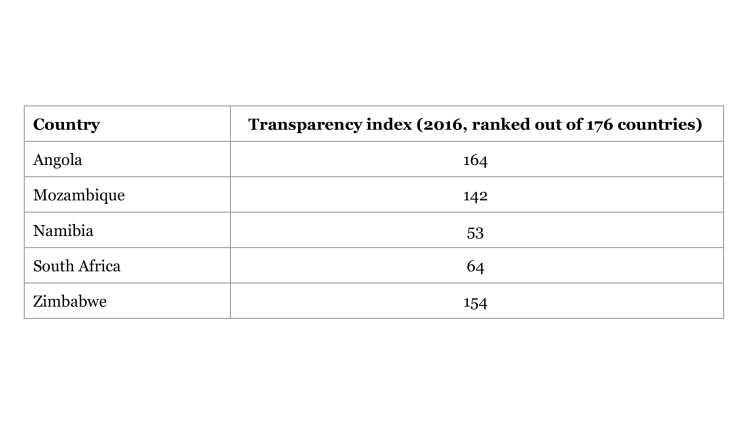
Spectacular cases of corruption, which tend to dominate the headlines and often generate widespread disgust, should be seen not in isolation but rather as the most obvious examples of the ways in which party-dominated networks have formed crony capitalist economies that reward insiders while excluding others.
While dominant-party regimes benefit massively from controlling the state machinery and all the advantages of incumbency, almost all are currently facing increasingly vocal discontent, prompting coercive state responses. Zimbabwe has routinely deployed violence to ensure its power and, as demonstrated by recent events, the ruling party is increasingly intertwined with the military and the other security forces. Mozambique faced four years (2013–2017) of low-intensity conflict with the former rebel movement and now major opposition party Resistência Nacional Moçambicana (Mozambican National Resistance, Renamo). The MPLA treats almost any form of protest harshly, with security forces responsible for numerous abuses. South Africa has long faced service delivery protests and labour disputes which have escalated into violence. More recently, the student-led Rhodes Must Fall movement – which started as a campaign to remove the statue of arch-imperialist Cecil Rhodes from the University of Cape Town – has swept through universities, with students protesting the continuation of black marginalisation. The demonstrations caused numerous schools to close and resulted in confrontations with the authorities. Even though most dominant-party regimes are likely to maintain their hold on power in the short term, the future appears increasingly precarious.
The Meaning of Democracy for Dominant-Party Regimes
Dominant-party regimes have adapted elements of democratisation to enhance their power without creating a climate of tolerance towards forms of opposition. Some – such as the ANC, SWAPO, and ZANU–PF (in the first election) – had free, non-racialised franchise and elections as a central demand of their liberation struggles. Other movements – such as Frelimo and the MPLA – took a dim view of multiparty elections yet were, as part of the peace treaties bringing longstanding civil wars to an end, forced to embrace them. While all now hold periodic elections, the ways in which these parties understand democracy is often at odds with the liberal model. Frelimo and the MPLA have long conceived of themselves as the legitimate expression of the people’s will, writ large, which is periodically ratified by elections. They fought to free the nation and formed the state. They are not simply one of several movements, ideologies, or trends seeking to shape the nation by representing a fraction of the population, however large; in many important ways they are the nation, and those outside their orbit are suspect citizens at best. Southall (2013) argues that democracy meant majoritarian rule for the ANC, SWAPO, and ZANU–PF and that since the liberation movements express the will of the majorities, their ascents to power are democracy. Anything that threatens their privileged place in the political order is tainted with the possibility of reactionary backsliding by agents of the old regime. Democratic reforms based largely on ensuring regular elections and the adoption of some liberal principles have been readily absorbed by dominant-parties without instilling a climate of compromise or cooperation. A possible exception could be South Africa, where the ANC is vigorously challenged by both the Democratic Alliance (DA) on the right and the Economic Freedom Fighters (EFF) on the left. However, the DA, the leading opposition party, is a historically white party (although the current leader is now black) and is still viewed with suspicion by sections of the black majority. Furthermore, the DA’s centre-right, pro-business political orientation is unlikely to alleviate the plight of the poor. On the other hand, Julius Malema, the leader of the EFF, is an anathema to South Africa’s minority groups (i.e. whites, Indians, and “coloureds”) and is widely distrusted by much of the nation’s middle class. It would be difficult for either party to build a social base sufficient enough to take state power.
The centralisation of power is reinforced through the ways in which dominant parties function. This is especially evident in countries like Mozambique and Angola, where – in the post-socialist period – dominant parties operate not only as political organisations that effectively control the state but also often serve as networks that link far-flung territories to the political centre. For instance, a village in Angola or Mozambique may not have a functioning health clinic but will most likely have a representative of the ruling party – an organisation that provides one of the major avenues of social mobility for the fortunate few that can demonstrate loyalty and worth. Programmes instituted by major donors to install “good governance” and create liberal democracy have paradoxically allowed parties to grow stronger and entrench themselves more deeply by accessing wealth and resources and gaining a veneer of international legitimacy. This does not mean that such systems are completely monolithic, as dominant parties are the centre of political and economic power and thus also become arenas of brutal factionalist competition. It is the outcomes of these factional fights, often conducted far from the prying eyes of outsiders, that tend to determine the overall policy of the state. In countries like South Africa and Namibia (and, to a lesser degree, Zimbabwe before the land invasions) dominant parties operate in a similar, if more racialised, manner. Given that much of the economic power was concentrated in the hands of the descendants of the settler elite, party structures offered new avenues for political and economic mobility among the party faithful (Southall 2013). Despite the egalitarian ethos championed during the liberation struggle, the most successful individuals have been members of groups that could claim some sort of middle-class status. These types of relationships create constituencies in the midst of widespread deprivation that, even if alienated from it, are often dependent on the party.
The Economy and Exclusion
With the exception of South Africa and Zimbabwe, most dominant-party regimes in southern Africa have enjoyed a long period of robust economic growth; however, this has not occurred in ways widely perceived as socially just. Now, almost all face far more difficult economic circumstances with the global drop in demand for natural resources, and internal tensions are becoming increasingly acute. Despite attempts to introduce various industrialisation programmes over the years, many southern African nations (with the exception of South Africa, although it has also undergone extensive deindustrialisation) retain their colonial economic position as exporters of raw materials. Increasingly, this economic model is taking the form of enclaves, mines, oil platforms, special export zones, plantations, and factories with special rights. These extractive networks are characterised by forms of intertwined sovereignty between local authorities, the state, and transnational actors – each with their own regulations, ideas about rights, infrastructures, and services. Enclaves form a “hierarchy of rights,” creating new forms of inclusion and citizenship (Buur, Nystrand, and Pedersen 2017). Simply being able to obtain some sort of stable and secure employment is a mark of privilege throughout most of southern Africa. Official statistics for the region often do a poor job of capturing the immense social complexity, the variety of employment forms and practices, and the power relationships subsumed by the seemingly straightforward term “employment,” while often relying on ambiguous and/or contradictory data. For example, estimates of Zimbabwe’s unemployment rate range from 5.09 per cent (Trading Economics 2017) to 90 per cent (The Zimbabwean 2017) for the same period. However, what can be gleaned from official estimates is the scale of unemployment in the region.
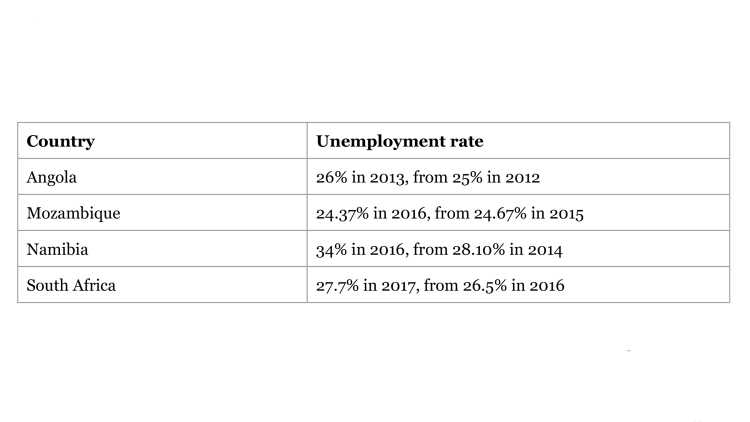
In a situation of widespread unemployment, enclaves create small numbers of relatively privileged workers who benefit from increased services. Dissenters, however, generally live under the threat of violent repression, which was used to deal with striking miners in Mozambique and South Africa and illegal diamond miners in Angola and Zimbabwe. Kirshner and Power argue that mining enclaves in Tete province, Mozambique, are reshaping both economic life and urban planning, recreating deeply exclusionary colonial models of company rule, on the one hand, and drawing local elites more tightly into international networks, on the other (Kirshner and Power 2015: 70). Enclaving as a model is increasingly becoming a wider spatial logic of privilege as evidenced by the meteoric rise in the number of gated communities (there are now more than 80 in the Mozambican capital of Maputo alone; Mazzolini 2016), restricted areas, forced removals of the poor from desirable areas of cities, and – even in some cases – the construction of entirely new cities to house the middle class and the elite away from the insecurity, crime, and dilapidated infrastructure that less privileged urbanites are forced to contend with.
The growing pervasiveness of an “enclaved” economic and residential model, which creates fortified islands of relative privilege cut off from wider society, contradicts the major claims of dominant-party states that the party is the embodiment of the people’s will. The victory of former liberation movements has not ushered in a new age of equality, as can be seen by the Gini coefficient.
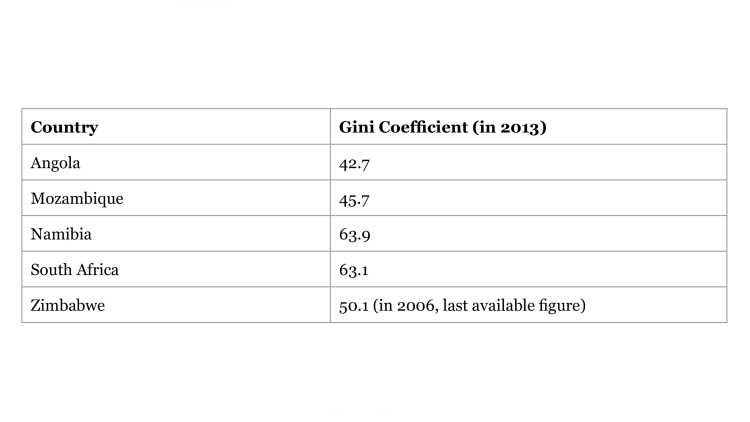
As with unemployment statistics, these figures give us an idea of the scale of the problem but tell us little about the underlying social complexity or the web of dependence and obligation that structures the social order. In his discussion of dependence and personhood in South Africa, James Ferguson (2013) contends that, in a situation where personhood is seen as a relational concept instead of an autonomous individual, dependence can create broader relationships and mutual obligations in hierarchical political systems. Such political systems were frequently paternalistic, brutal, and exploitative but tended to follow a cultural logic of inclusion. They were “people hungry” and sought to increase the membership of the polity. While this was based on cruel and widely resented subordination, there was the possibility of security and even upward mobility. Examples include apartheid-era South Africa’s never-ending need for mining labour or socialist Mozambique’s ambitious attempts to (forcibly, if need be) transform and include the peasantry in the party’s nation-building project through villagisation and collective farming. However, many former national liberation movements have come to embrace a political and economic model that simply does not require such vast attempts at social mobilisation. The result being that the majorities in such countries are banished to the so-called subsistence or informal sectors (Ferguson 2013: 233; see also Sumich 2015). Not only does this approach increase social polarisation, but it does so in a way that dramatically undermines existing ideas of what is considered socially just. To illustrate this point, Ferguson (2013: 236) refers to a political opinion poll in which “the majority of South Africans agreed with the statement ‘people are like children, the government should take care of them like a parent.’” I am not aware if similar polls exist in Angola, Namibia, Mozambique, or Zimbabwe, but one frequently hears such sentiments. Phrases like “the government needs to give me a job” and “the government needs to take care of us” are common. The problem is not necessarily that the state is paternalistic, enforcing a rigid hierarchy that represses the entrepreneurial energies of its citizens, but rather that it is a bad parent, abusive and neglectful of its children. Further difficulties remain even for the small minority lucky enough to be included in the formal economy. Many major economic enterprises in southern Africa often have deeply racialised labour hierarchies, with white expatriates, white South Africans, and Asians numerically over-represented in management and supervisory positions. This tends to create a situation reminiscent of the old colonial order, the overthrow of which has been the basis for the legitimacy of dominant-party states. The increasing impatience with perceived colonial legacies is not restricted solely to questions of labour, as can be seen with the Rhodes Must Fall movement, which was initiated by South African university students – many of whom attend prestigious institutions and come from middle-class social backgrounds.
Do Proposed Solutions Reinforce the Problem?
The methods recommended to countries more dependent on donors (e.g. Mozambique and Namibia) and to international organisations (e.g. the IMF, World Bank, and G20) for dealing with the multiple crises in southern African dominant-party states tend to be based on variants of democratisation, economic liberalisation, and anti-corruption initiatives. A prime example is the G20’s Compact with Africa. Kappel and Reisen (2017: 3) argue that in the Compact with Africa (CWA) “macroeconomic measures have an orthodox agenda, with a set of well-known (neoliberal) recommendations: fiscal discipline, redirecting public expenditure, tax reform, financial liberalisation, elimination of barriers to foreign direct investment, privatisation of state-owned enterprises, deregulation of market entry and competition, and security of property rights.” Very similar sets of measures have been proposed multiple times in the last 30 years and still largely fail to achieve their ostensive goals.
Southern Africa has long been characterised by democratic deficits, deep-seated economic problems, and pervasive corruption. Thus, the methods proposed by donors, international organisations, and foreign governments (such as Germany’s CWA) – which have been employed for decades – will not change the regional situation. Dominant parties in southern Africa have proven highly adept at introducing elements of liberalism to more authoritarian political systems. They have melded together constitutional promises of a wide array of civic and social rights and regular elections into their own conceptions of democracy. Most dominant parties operate as political machines that are highly successful at winning elections through means both legal and illicit; in fact, in certain southern African nations powerful organisations like the military are unlikely to accept the electoral defeat of the dominant party. In Zimbabwe the military currently acts as the preeminent power broker. Nevertheless, despite deposing Robert Mugabe – a move that gained it considerable popularity – the military has thus far refused to rule in its own right. Instead, it appears to have acted in an effort to bolster the power of allied factions and individuals within ZANU–PF.
Even in cases where the opposition could take power, doubts remain about the transformative potential of such an event. In many southern African nations it is not clear how opposition parties differ ideologically from ruling parties despite the fact that opposition parties represent different constituencies and are skilled in employing buzzwords like “transparency.” Moreover, economic constraints in the region also currently cast doubt on how extensively they could transform the system. Liberal economic reforms have allowed many dominant parties in southern Africa to more deeply entrench themselves in the political and economic fabric of their respective nations. Due to the wealth brought about by natural resource exports, the monopolisation of access to donors, the role of high-ranking cadres in dominating the economy through privatisation programmes, and partnerships with transnational conglomerations, dominant parties have been able to centralise wealth and power in ways that would have been impossible under earlier, leftist-inspired political projects. Therefore, whether opposition movements are able to drastically reform the system or will simply preside over what already exists remains an open question. The ability of elite actors to engage in corruption with relative impunity is also a serious social problem and should be dealt with by legal means. However, a criminally punitive approach only addresses certain aspects of corruption as it appears in daily life, ignoring other potent manifestations. As Yazan Doughan (2017) points out, corruption also encompasses more subtle – though not technically illegal – practices, such as economies of favours within closed, party-based political and kin networks that concentrate privilege, resources, and opportunities among certain groups to the detriment of others. Several of the underlying problems faced by dominant-party states in southern Africa arise from complex questions of distributive justice and inclusion that are rooted in the histories and particular social contexts of the nations in question. Generic measures of democratisation and liberalisation not only have failed to address these problems but may have also contributed to growing social polarisation. Even the extensive welfare grants and programmes provided by South Africa have largely failed to diminish rampant inequality. The region requires new ideas that are less dogmatically based on the reigning ideologies of donor nations and are tailored not only to attract FDI but also to create more inclusive societies. Both within the region and among donors, there is a real need for in-depth discussions concerning the distribution of state profits and natural resources more widely among the population. Furthermore, the possibility of introducing mechanisms that guarantee everyone, regardless of social status or political affiliation, access to universal provisions, such as a basic income, should also be explored.
Footnotes
References
Buur, Lars, Malin Nystrand, and Rasmus Hundsbæk Pedersen (2017), The Political Economy of Land and Natural Resource Investments in Africa: An Analytical Framework, Working Paper, Copenhagen: Danish Institute for International Studies (DIIS).
Central Intelligence Agency (2017), The World Factbook, Country Comparison: Distribution of Family Income – Gini Index (8 November 2017).
Doughan, Yazan (2017), Corruption in the Middle East and the Limits of Conventional Approaches, GIGA Focus Middle East, 5, Hamburg: GIGA, www.giga-hamburg.de/en/publication/corruption-in-the-middle-east-and-the-limits-of-conventional-approaches (8 November 2017).
Ferguson, James (2013), Declarations of Dependence: Labour, Personhood, and Welfare in Southern Africa, in: Journal of the Royal Anthropological Institute, 19, 223–242.
Kappel, Robert, and Helmut Reisen (2017), The G20 “Compact with Africa”: Unsuitable for African Low-Income Countries, Working Paper, Berlin: Friedrich Ebert Stiftung, http://library.fes.de/pdf-files/iez/13441.pdf.
Kirshner, Joshua D., and Marcus Power (2015), Mining and Extractive Urbanism: Postdevelopment in a Mozambican Boomtown, in: Geoforum, 61, 67–78.
Mazzolini, Anna (2016), An Urban Middle Class and the Vacillation of “Informal” Boundaries – Insights from Maputo, Mozambique, in: Geography Research Forum, 36, 68–85.
Southall, Roger (2013), Liberation Movements in Power: Party and State in Southern Africa, Pietermaritzburg: James Currey and University of KwaZulu-Natal Press.
Sumich, Jason (2015), The Uncertainty of Prosperity: Dependence and the Politics of Middle Class Privilege in Maputo, in: Ethnos, 1, 1–21.
The Zimbabwean (2017), Zimbabwe’s Unemployment Rate at 90 Percent: Union, 4 May, www.thezimbabwean.co/2017/05/zimbabwes-unemployment-rate-90-per cent-union/ (8 November 2017).
Trading Economics (2017), New York, https://tradingeconomics.com (8 November 2017).
Transparency International (2017), Corruption Perceptions Index 2016, Berlin, 25 January, www.transparency.org/news/feature/corruption_perceptions_index_2016 (8 November 2017).
United Nations Development Programme (2017), Human Development Reports: Income Gini Coefficient, http://hdr.undp.org/en/content/income-gini-coefficient (8 November 2017).
General Editor GIGA Focus
Editor GIGA Focus Africa
Regional Institutes
Research Programmes
How to cite this article
Sumich, Jason (2017), The Slow Decay of Southern Africa’s Dominant-Party Regimes, GIGA Focus Africa, 8, Hamburg: German Institute for Global and Area Studies (GIGA), http://nbn-resolving.de/urn:nbn:de:0168-ssoar-54999-4
Imprint
The GIGA Focus is an Open Access publication and can be read on the Internet and downloaded free of charge at www.giga-hamburg.de/en/publications/giga-focus. According to the conditions of the Creative-Commons license Attribution-No Derivative Works 3.0, this publication may be freely duplicated, circulated, and made accessible to the public. The particular conditions include the correct indication of the initial publication as GIGA Focus and no changes in or abbreviation of texts.
The German Institute for Global and Area Studies (GIGA) – Leibniz-Institut für Globale und Regionale Studien in Hamburg publishes the Focus series on Africa, Asia, Latin America, the Middle East and global issues. The GIGA Focus is edited and published by the GIGA. The views and opinions expressed are solely those of the authors and do not necessarily reflect those of the institute. Authors alone are responsible for the content of their articles. GIGA and the authors cannot be held liable for any errors and omissions, or for any consequences arising from the use of the information provided.


